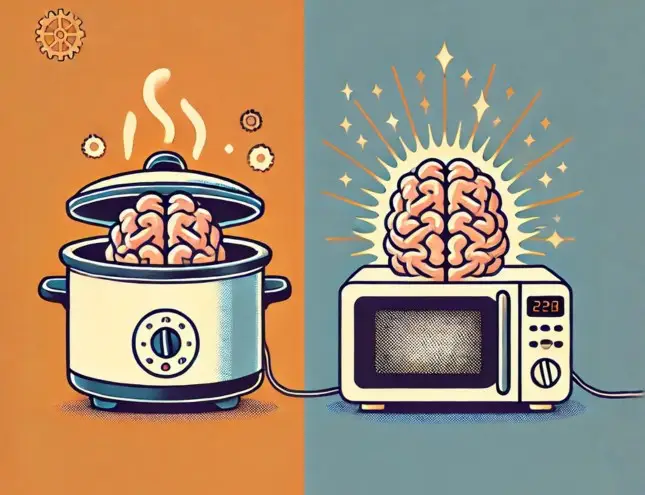You may be looking for executive dysfunction help—for yourself, your teen, or your college student. The good news? There are executive function strategies that can make a real difference.
Whether you’re struggling with organization, time management, task initiation, or emotional regulation, it’s possible to build the skills that support daily success. In this post, we’ll walk through five practical, proven strategies you can start using today.
A quick disclaimer: We’re not just here to tell you to “track your time” or “use a planner.” If it were that simple, you wouldn’t be here looking for solutions!
Executive function challenges don’t mean someone is lazy or unmotivated. They mean the brain struggles to manage tasks like organizing, starting, or finishing—especially when overwhelmed. But that also means there are ways to work with it and build systems that actually fit how your brain works.
Ready? Let’s explore five executive function strategies that can help.

Executive Function Strategy #1: Accountability
We start with this one for a reason—accountability is huge when it comes to executive function. In fact, studies show that external accountability significantly increases follow-through and goal achievement, especially for individuals with ADHD and executive dysfunction.
Why? Because executive function challenges make it hard to self-start, monitor progress, and stay organized without outside structure. Accountability provides that scaffolding until internal skills strengthen.
Here are a few ways to build accountability into everyday life:
- Coaching: An executive function or ADHD coach provides structured, judgment-free check-ins that help break big goals into manageable steps—and keep progress moving.
- Parent/teacher support: For teens, a parent or teacher can serve as an accountability partner by setting clear expectations and celebrating wins.
- Peer accountability: Study buddies, accountability groups, or even a trusted friend can provide simple reminders and encouragement.
- Tools and apps: Task trackers, habit apps, and shared digital calendars offer visual accountability and help offload memory load.
The key? Regular, external touchpoints that reduce overwhelm and build momentum. Accountability turns “I should” into “I did.”
👉 Our Tip: Accountability has to be felt.
We’re naturally more likely to let ourselves down than someone else—but not all accountability partners are created equal. Sometimes it’s easy to convince a friend to slack off, or tune out a parent’s (well-meaning) reminders.
The thing is… everyone can feel like a “unicorn” when they’re motivated—for a moment. Then life kicks back in. One helpful exercise: think back to a time when you felt the frustration or shame of dropping the ball. Really feel it. That memory can remind us why true accountability matters.
Working with a coach helps build long-term structures by exploring what types of accountability actually stick for that student or adult. But even independently, here are a few great tools to try:
- Focusmate — virtual co-working sessions that create felt accountability through real-time body doubling.
- Beeminder — a goal-tracking app with financial stakes, so you have skin in the game (and motivation to follow through).
The right accountability system reduces decision fatigue and turns good intentions into action.

Executive Function Strategy #2: Routine & Structure
We know, we know—easier said than done. And sometimes, the routine we just knew would work… falls apart after a few days (or hours!). That’s normal—and it doesn’t mean you’re failing.
Here’s why: routines require executive function strength—the very thing we’re trying to build. The brain’s prefrontal cortex is responsible for planning, initiating, and sustaining routines. For individuals with executive dysfunction, these processes take more mental energy and aren’t automatic.
The science shows that for routines to stick:
- They need clear triggers (same time, place, or cue)
- They need manageable steps (not perfection)
- They need consistent repetition—paired with accountability to keep going when motivation dips
And here’s the secret: structure isn’t about rigid schedules. It’s about creating predictable anchors in the day that reduce decision fatigue and free up mental energy for the stuff that matters.
👉 Our Tip: Benefit. Necessity. Leniency.
When building routines, think in three layers: Benefit, Necessity, Leniency.
Benefit: First, anchor your routine to something enjoyable or rewarding. For example: take meds with your favorite coffee, after a morning workout, or before watching a quick YouTube video. If this week’s hyperfocus is a trending smoothie? Great—that’s your anchor. The goal is to make the start of the routine feel good.
Necessity: Next, link your routine to something that can’t be missed. What’s a non-negotiable in your day (school, a class, work, feeding the dog)? Place 3 visual reminders in your environment to cue this step—on your mirror, phone lock screen, desk, or even your water bottle.
Leniency: Finally, build in flexibility. We all crave freedom, and feeling too “locked in” can trigger avoidance. Your routine should have wiggle room—maybe it’s a flexible start time or alternate ways to complete a step. The goal is progress, not perfection.
By balancing these three elements, routines feel more doable—and more likely to stick.

Executive Function Strategy #3: Time Management
ADHD, executive dysfunction, and neurodivergence aren’t linked to “time blindness” for no reason—the way our brains process time is simply different. Finding executive function strategies that work with (not against) this reality is essential.
Here’s what we know:
- Time perception is often nonlinear—minutes, hours, and days can feel either too short or impossibly long.
- The brain tends to hyperfocus on the “now” and lose track of “later” unless time is made visible.
- Deadlines without structure = stress without action. Urgency alone doesn’t build time management skills.
Here are a few time management tips that actually help (even when it’s hard):
- Externalize time. Use large visual timers, time-blocked calendars, or apps like Time Timer to make time visible.
- Break time into short “chunks.” The Pomodoro technique (25 mins on, 5 mins off) works because it reduces overwhelm and builds momentum.
- Anchor tasks to cues, not just clocks. For example, “start homework right after lunch” vs. “start homework at 2:00 pm.” Our brains respond better to routines than to arbitrary times.
👉 Our Tip: Start with Time “Training Wheels”
Time management happens over, well… time. You don’t have to master it all at once—start with small supports (aka “training wheels”) to help your brain feel and track time more consistently.
Here are some executive function strategies that help with time:
1️⃣ Start with a body double.
Body doubling is when you do tasks alongside another person to stay anchored and engaged. Science shows that co-regulation (sharing focus with another brain) helps those with executive dysfunction sustain attention and resist distractions.
A personalized ADHD coach makes an excellent body double because they provide real-time encouragement and pacing. You can also try an app like Focusmate to match with someone working on their own tasks at the same time.
2️⃣ Train your brain to “feel” time.
Even when you’re not in focus mode, practice tuning in to time passing. One trick: set continuous 20-minute timers throughout your day. When they buzz, simply notice what you’ve done in the last 20 minutes. No judgment—just gentle awareness.
3️⃣ Use an “End of Day” song.
Pick a fun, upbeat song to play every night at a set time—this becomes a cue for your brain to start evening shutdown routines (packing your bag, brushing teeth, prepping for the next day). It’s weirdly effective—and a lot more fun than a standard alarm!
Executive Function Strategy #4: Mindfulness & Stress Management
We like to say it: almost no one knows overwhelm like a neurodivergent brain. And that’s not an exaggeration—there’s real science behind why stress and overwhelm hit harder when you’re living with ADHD, executive dysfunction, or related challenges.
Why is this true?
- Emotional regulation and executive function share brain pathways. When executive function is compromised, emotional reactivity tends to be stronger.
- Cognitive load builds faster. Neurodivergent brains often process more sensory input and detail, which leads to quicker overload.
- Task initiation and transitions are harder. When stuck, stress hormones increase, making it even tougher to get started or shift between tasks.
Tips to reduce overwhelm and build mindfulness:
- Micro-mindfulness moments: You don’t need a 30-minute meditation. Even 3 deep breaths between tasks can reset your nervous system.
- Body-based calming: Activities like walking, stretching, or even holding a warm mug can soothe sensory overwhelm.
- Name the overwhelm. Saying “I’m feeling overloaded right now” engages the brain’s language centers, which helps regulate emotions and shift gears.
👉 Our Tip: We literally wrote the guide to overwhelm (really).
Want to dive deeper? We created Overcoming Overwhelm—a free guide for teens and young adults packed with practical tools to manage stress and executive dysfunction.
It’s yours—on the house.
[Click here to download the guide.]
Executive Function Strategy #5: Skill Development
The essential executive function skills include:
- Time management
- Organization
- Task initiation
- Planning and prioritization
- Working memory
- Emotional regulation
- Flexibility/adaptability
Building these skills takes time—but it’s oh, so worth it. These are life skills that pay off not just in school, but in careers, relationships, and daily living. There are some great executive function strategies that can help solidify these skills!
Here are some great ways to start building executive function skills:
- Online courses on time management, organization, or study skills (Tip: Look for those designed for neurodivergent learners—they tend to be more realistic and actionable.)
- Videos and podcasts — short, relatable content can introduce new techniques in an easy-to-digest way.
- Working with an Executive Function or ADHD coach — personalized coaching provides structure, accountability, and tools tailored to your brain.
- Practice and real-life application — skills “stick” when practiced in real contexts (school, home, work), not just in theory.
The key: start small, stay flexible, and celebrate progress. Skill building is a journey, not a checklist.
👉 Our Tip: Building executive function skills is possible—but it takes time.
First step? Block that “all or nothing” thinking.
Brains like ours (yes, ours—you’re not alone!) are wired for quick dopamine, all-or-nothing thinking, and perfectionism. That means we often crave “perfect days” where everything clicks… or we spiral if it doesn’t.
That’s a recipe for, well… disappointment.
Instead, focus on just one skill at a time. Ask yourself:
What’s the ONE skill I can lean into and build this month?
It’s tempting to want all the skills at once—but long-term growth comes from steady progress, not perfect days. One skill at a time = real change.

Want help implementing these strategies—and finding what works for YOU or your child?
We’re here to help.
✅ Book a Free Clarity Call — let’s chat about your needs and explore coaching options.
✅ Download our Free Info Guide — get an inside look at how our coaching works.
✅ Have a question? Just ask us here! — we love hearing from families and students.
You don’t have to figure this out alone—support is just a click away. 💛



